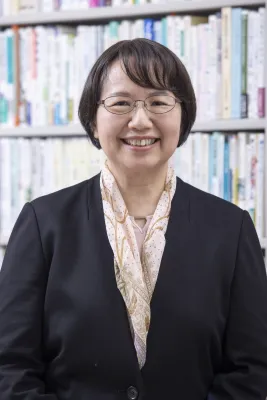Developing regional leaders with deep expertise and comprehensive skills

Head School of Regional Development Studies, College of Human and Social Sciences, Kanazawa University
TAKAHASHI Ryoko
Since its establishment in 2008, the School of Regional Development Studies has accumulated practical experience in the field of regional development, producing many individuals who are now active in their communities as civil servants and corporate employees. In addition, there are many graduates who continue to gain experience and expand their networks after graduation, engaging in unique activities to solve regional issues.
Recently, the environment surrounding the area where we live has become increasingly globalized, and local issues have become more complex, involving many global factors. Rather than limiting our learning to individual local issues, we implemented a new program-based curriculum in 2022 to promote a comprehensive and integrated understanding of the region and to address regional issues, which is the goal of the School of Regional Development Studies.
Point 1: The curriculum has been reorganized from the conventional course system into two subject groups that focus on contemporary regional issues and the students’ own future visions. Students can study core programs selectively from each subject group, allowing them to take a proactive approach to learning while considering their own career paths.
Point 2: The regional issues subject group, which aims to provide an understanding of various issues in different regions and equip students with specialized knowledge, offers three programs; “Society and Environment,” “Regional Collaboration,” and “Diversity and Inclusion”. The programs address key issues in modern society in relation to people and nature, people and regions, and people and people. Students deepen their learning in the core programs while also studying subjects from other programs in a cross-disciplinary manner to understand the connections and interrelationships between regional issues.
Point 3: The subject group of regional development studies, which focuses on developing the skills necessary to become leaders in community development while considering one’s future career path, offers two programs: the “Public Policy Program”, which is designed for those considering careers in public service or policy-making, and the “Regional Management Program”, which is designed for those considering careers in the private sector, such as corporations or non-profit organizations (NPOs). Through these programs, students learn the knowledge and skills required for their future careers. While deepening their understanding of the core program, students also study subjects from the other program in a cross-disciplinary manner, understanding the relationships and interdependence between the public and private sectors.
Point 4: Through practical involvement in the community as a field of study, including internships and other experiences accumulated by the School of Regional Development Studies, as well as detailed learning support such as small-group seminars, students acquire in-depth knowledge of their chosen regional issues and practical skills in the field.
Point 5: To help students choose the program that best matches their interests, we offer “Basic Seminars” in which students learn about the research fields and methods of each program and faculty members, and participate in “Special Seminar on Regional Development Studies” where they attend graduation research presentations by senior students in their fourth year to learn about various program research themes and methods and participate in discussions, thereby cultivating a broad perspective on regional issues.



